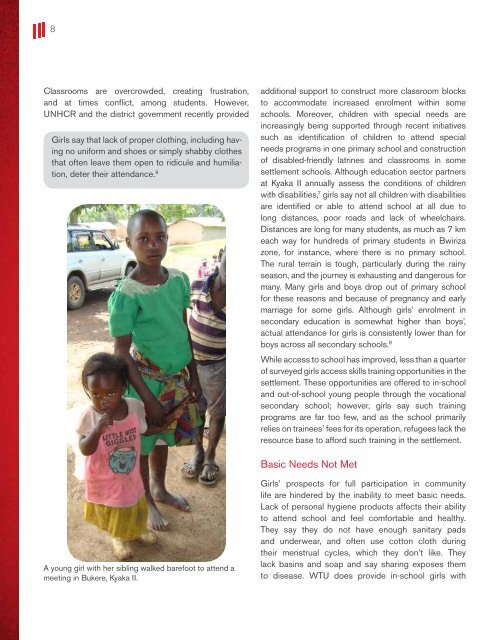Scattered Dreams, Broken Promises - Women's Refugee Commission
Scattered Dreams, Broken Promises - Women's Refugee Commission
Scattered Dreams, Broken Promises - Women's Refugee Commission
You also want an ePaper? Increase the reach of your titles
YUMPU automatically turns print PDFs into web optimized ePapers that Google loves.
8<br />
Classrooms are overcrowded, creating frustration,<br />
and at times conflict, among students. However,<br />
UNHCR and the district government recently provided<br />
Girls say that lack of proper clothing, including having<br />
no uniform and shoes or simply shabby clothes<br />
that often leave them open to ridicule and humiliation,<br />
deter their attendance. 9<br />
additional support to construct more classroom blocks<br />
to accommodate increased enrolment within some<br />
schools. Moreover, children with special needs are<br />
increasingly being supported through recent initiatives<br />
such as identification of children to attend special<br />
needs programs in one primary school and construction<br />
of disabled-friendly latrines and classrooms in some<br />
settlement schools. Although education sector partners<br />
at Kyaka II annually assess the conditions of children<br />
with disabilities, 7 girls say not all children with disabilities<br />
are identified or able to attend school at all due to<br />
long distances, poor roads and lack of wheelchairs.<br />
Distances are long for many students, as much as 7 km<br />
each way for hundreds of primary students in Bwiriza<br />
zone, for instance, where there is no primary school.<br />
The rural terrain is tough, particularly during the rainy<br />
season, and the journey is exhausting and dangerous for<br />
many. Many girls and boys drop out of primary school<br />
for these reasons and because of pregnancy and early<br />
marriage for some girls. Although girls’ enrolment in<br />
secondary education is somewhat higher than boys’,<br />
actual attendance for girls is consistently lower than for<br />
boys across all secondary schools. 8<br />
While access to school has improved, less than a quarter<br />
of surveyed girls access skills training opportunities in the<br />
settlement. These opportunities are offered to in-school<br />
and out-of-school young people through the vocational<br />
secondary school; however, girls say such training<br />
programs are far too few, and as the school primarily<br />
relies on trainees’ fees for its operation, refugees lack the<br />
resource base to afford such training in the settlement.<br />
Basic Needs Not Met<br />
A young girl with her sibling walked barefoot to attend a<br />
meeting in Bukere, Kyaka II.<br />
Girls’ prospects for full participation in community<br />
life are hindered by the inability to meet basic needs.<br />
Lack of personal hygiene products affects their ability<br />
to attend school and feel comfortable and healthy.<br />
They say they do not have enough sanitary pads<br />
and underwear, and often use cotton cloth during<br />
their menstrual cycles, which they don’t like. They<br />
lack basins and soap and say sharing exposes them<br />
to disease. WTU does provide in-school girls with






